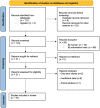Evaluation of Risk and Preventive Factors for Necrotizing Enterocolitis in Premature Newborns. A Systematic Review of the Literature
- PMID: 35656377
- PMCID: PMC9152085
- DOI: 10.3389/fped.2022.874976
Evaluation of Risk and Preventive Factors for Necrotizing Enterocolitis in Premature Newborns. A Systematic Review of the Literature
Abstract
Necrotizing enterocolitis (NEC) is a serious condition related to prematurity and the initiation of enteral feeding. In this article, we review the evidence published in recent years on necrotizing enterocolitis risk factors (prematurity, feeding with low-weight formula, existence of intestinal dysbiosis) and protective factors (human milk or donated milk supply, supplementation of human milk with oligosaccharides, probiotics administration, and the determination of disease predictive biomarkers). A systematic review was conducted of preventive, risk and predictive factors for necrotizing enterocolitis in neonates prior to 37 weeks' gestational age, based on a literature search for clinical trials, meta-analyses, randomized controlled trials and systematic reviews published between January 2018 and October 2021. For this purpose, the PubMed, MEDLINE, and Cochrane Library databases were consulted. The literature search obtained 113 articles, of which 19 were selected for further analysis after applying the inclusion and exclusion criteria. The conclusions drawn from this analysis were that adequate knowledge of risk factors that can be prevented or modified (such as alteration of the intestinal microbiota, oxidative stress, metabolic dysfunction at birth, or alteration of the immunity modulation) can reduce the incidence of NEC in premature infants. These factors include the supplementation of enteral nutrition with human milk oligosaccharides (with prebiotic and immunomodulatory effects), the combined administration of probiotics (especially the Lactobacillus spp and Bifidobacterium spp combination, which inhibits bacterial adhesion effects, improves the intestinal mucosa barrier function, strengthens the innate and adaptive immune system and increases the secretion of bioactive metabolites), the supplementation of human milk with lactoferrin and the use of donated milk fortified in accordance with the characteristics of the premature newborn. The determination of factors that can predict the existence of NEC, such as fecal calprotectin, increased TLR4 activity, and IL6 receptor, can lead to an early diagnosis of NEC. Although further studies should be conducted to determine the values of predictive biomarkers of NEC, and/or the recommended doses and strains of probiotics, lactoferrin or oligosaccharides, the knowledge acquired in recent years is encouraging.
Keywords: dysbiosis; enteral nutrition; human milk; necrotizing enterocolitis; probiotics.
Copyright © 2022 Campos-Martinez, Expósito-Herrera, Gonzalez-Bolívar, Fernández-Marin and Uberos.
Conflict of interest statement
The authors declare that the research was conducted in the absence of any commercial or financial relationships that could be construed as a potential conflict of interest.
Figures
Similar articles
-
Probiotics for prevention of necrotizing enterocolitis in preterm infants.Evid Based Child Health. 2014 Sep;9(3):584-671. doi: 10.1002/ebch.1976. Evid Based Child Health. 2014. PMID: 25236307 Review.
-
Cochrane in context: probiotics for prevention of necrotizing enterocolitis in preterm infants.Evid Based Child Health. 2014 Sep;9(3):672-4. doi: 10.1002/ebch.1977. Evid Based Child Health. 2014. PMID: 25236308
-
The human milk oligosaccharides 2'-fucosyllactose and 6'-sialyllactose protect against the development of necrotizing enterocolitis by inhibiting toll-like receptor 4 signaling.Pediatr Res. 2021 Jan;89(1):91-101. doi: 10.1038/s41390-020-0852-3. Epub 2020 Mar 27. Pediatr Res. 2021. PMID: 32221473 Free PMC article.
-
Probiotics reduce the risk of necrotizing enterocolitis in preterm infants: a meta-analysis.Neonatology. 2010;97(2):93-9. doi: 10.1159/000235684. Epub 2009 Aug 25. Neonatology. 2010. PMID: 19707025 Review.
-
Effect of oral probiotics supplementation in the prevention of necrotizing enterocolitis among very low birth weight preterm infants.J Med Assoc Thai. 2014 Jun;97 Suppl 6:S20-5. J Med Assoc Thai. 2014. PMID: 25391168 Clinical Trial.
Cited by
-
Construction and evaluation of a risk model for adverse outcomes of necrotizing enterocolitis based on LASSO-Cox regression.Front Pediatr. 2024 Oct 7;12:1366913. doi: 10.3389/fped.2024.1366913. eCollection 2024. Front Pediatr. 2024. PMID: 39435385 Free PMC article.
-
In-hospital mortality among neonates with necrotising enterocolitis in Ethiopia: a systematic review and meta-analysis.BMJ Open. 2024 Dec 22;14(12):e084003. doi: 10.1136/bmjopen-2024-084003. BMJ Open. 2024. PMID: 39806592 Free PMC article.
-
Microbe Profile: The Lactobacillaceae.Microbiology (Reading). 2023 Dec;169(12):001414. doi: 10.1099/mic.0.001414. Microbiology (Reading). 2023. PMID: 38088348 Free PMC article.
-
Clinical Characteristics of Necrotizing Enterocolitis Diagnosed by Independent Adjudication of Abdominal Radiographs, Laparotomy, or Autopsy in Preterm Infants in the "Connection Trial".Am J Perinatol. 2025 Jan;42(2):268-280. doi: 10.1055/s-0044-1788275. Epub 2024 Jul 10. Am J Perinatol. 2025. PMID: 38986486 Free PMC article. Clinical Trial.
-
Factors That Influence the Sustainability of Human Milk Donation to Milk Banks: A Systematic Review.Nutrients. 2022 Dec 9;14(24):5253. doi: 10.3390/nu14245253. Nutrients. 2022. PMID: 36558411 Free PMC article.
References
-
- Robertson C, Robertson C, Savva GM, Clapuci R, Jones J, Maimouni H, et al. . Incidence of necrotising enterocolitis before and after introducing routine prophylactic Lactobacillus and Bifidobacterium probiotics. Arch Dis Childh Fetal Neonatal Ed. (2020) 105:380–6. 10.1136/archdischild-2019-317346 - DOI - PMC - PubMed
Publication types
LinkOut - more resources
Full Text Sources
Medical
Miscellaneous


